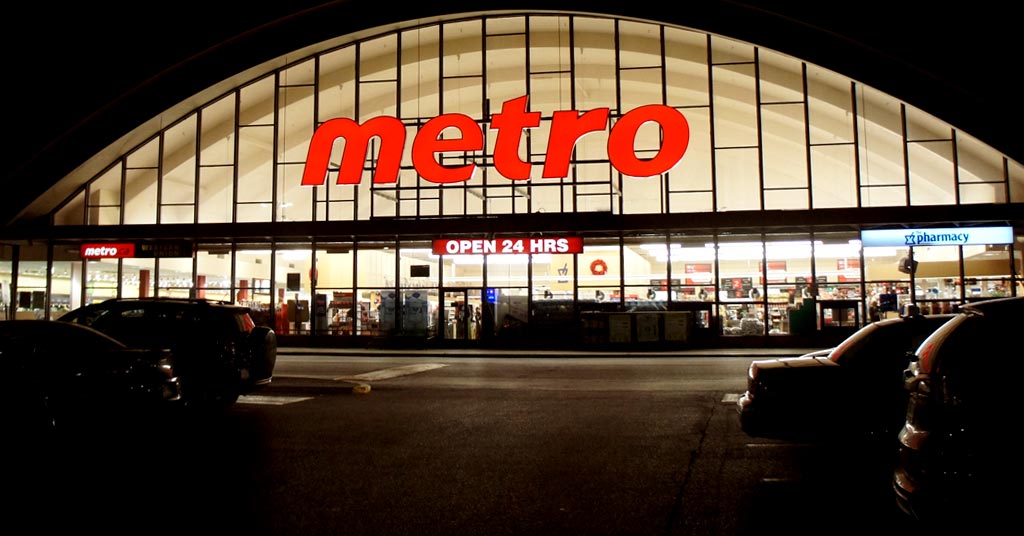
Wages For Metro’s Grocery Store Workers Aren’t Keeping Pace With Canada’s Skyrocketing Costs of Living
Metro grocery workers are on strike looking for wages that they can live on after taking real pay cuts for years
Thousands of Metro grocery workers, across 27 stores, are on strike in the Greater Toronto Area – after they rejected an initial wage offer that fell short of expectations.
While the details of the rejected contract have not been made public, a version obtained by PressProgress noted a 4 year increase of $2.65 for the overwhelming majority of its part-time clerks, (those hired since 1997). That would start with an increase of $1.25 but soon would be limited to $0.50 in year 2, $0.45 in year 3 and another $0.45 in Year 4.
For one worker, who spoke to PressProgress on condition of anonymity, that works out to an average increase of 3.8% per year – below the rate of inflation for the last two years.
“This decision to go on strike comes after years of these workers being nickelled and dimed while facing increased precarity and eroded job quality,” Unifor National President Lana Payne said in a recent statement. “We brought the tentative agreement to our members because it contained considerable gains, but our members are clear that it simply isn’t enough.”
Here’s what Metro workers, who are on strike, are telling us. One woman who has worked with the company for 25 years is living in subsidized housing because that’s all she can afford. pic.twitter.com/ZgwWi6h4R9
— Ahmar Khan (@AhmarSKhan) July 31, 2023
Brock University labour studies professor Larry Savage says the rejection also reflects the workers’ rising expectations.
“Pre-pandemic, the contract Unifor negotiated with Metro would have been considered a good deal,” Savage told PressProgress. “But grocery store workers have higher expectations now given inflation and the cost of living crisis. Having the best contract in the sector means nothing if you still can’t pay for rent, or bills, or food from the very grocery store where you work.
“These workers want a living wage and what Metro has on offer doesn’t come close.”
“It’s total pressure, they’re making all this money and they don’t pay us enough,” one worker told Global News. “We help them to make all this money and we deserve better.”
“I’ve heard a lot of my coworkers talking about using foodbanks,” another worker said.
A spokesperson for Metro declined requests for comment, telling PressProgress the company “won’t get into the specifics of the agreement publicly.”
However, in the workers’ last contract, which ran from 2019-23, every category of worker at Metro took a real pay cut.
The wage rate after 30 months for clerks rose from $17.65 per hour to $18.85 by the end of 2022 – an increase of $1.20 or 6.7%.
For meat cutters, the agreement raised their wages from $19.15 per hour to $19.55, to $19.95 and finally to $20.35, another $1.20 increase or 6.2%.
The company’s produce chief clerks also took a pay cut – seeing a rise from $20.90 to $22.10 over four years – an increase of $1.20 or 5.7%.
At Metro’s New Dominion stores, grocery workers also took a real pay cut.
The small number of grocery clerks hired before 1978 saw their pay rise from $23.37 per hour in 2020 to $24.57 this year – a total rise of $1.20 or 5.1%.
Those hired between 1978 and 1997 saw an increase from $23.17 to $24.37 over four years – a total increase of $1.20 or 5%.
Those hired since, according to the contract, who worked at Metro for at least 12 months $23.61 to $24.81 a total increase of $1.20 or 5%.
By comparison, according to Bank of Canada data, inflation has risen by 15.3% since 2019, with an average annual decline in the value of money of 3.63% per year. Much of this accelerated during and since the pandemic – with inflation rising 14.58% since 2020.
“You know the system is broken when frontline workers can’t afford food, rent or gas,” Unifor Local 414 President Gord Currie said in a Unifor statement.
Our journalism is powered by readers like you.
We’re an award-winning non-profit news organization that covers topics like social and economic inequality, big business and labour, and right-wing extremism.
Help us build so we can bring to light stories that don’t get the attention they deserve from Canada’s big corporate media outlets.
Donate



